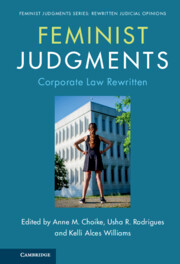Book contents
- Feminist Judgments: Corporate Law Rewritten
- Feminist Judgments Series Editors
- Advisory Panel for Feminist Judgments Series
- Feminist Judgments: Corporate Law Rewritten
- Copyright page
- Dedication
- Contents
- Advisory Panel for Feminist Judgments: Corporate Law Rewritten
- Notes on Contributors
- Acknowledgments
- About the Cover Art
- Table of Cases
- Part I Introduction and Overview
- Part II Legal Personality, Identity, and Limited Liability of Corporate Entities
- Part III Role and Purpose of the Corporation and Corporate Combinations in Society
- Part IV Fiduciary Duties in Corporate Governance
- 8 Commentary on Meinhard v. Salmon
- 9 Commentary on Smith v. Van Gorkom
- 10 Commentary on White v. Panic
- 11 Commentary on Francis v. United Jersey Bank
- 12 Commentary on In re The Walt Disney Co. Derivative Litigation
- Part V Closely Held Businesses and Other Considerations Regarding the Composition of Boards, Management, and Owners
- Part VI Protecting Investors and Potential Investors in Corporations
- Part VII From Foundations to Future Directions
- Index
12 - Commentary on In re The Walt Disney Co. Derivative Litigation
from Part IV - Fiduciary Duties in Corporate Governance
Published online by Cambridge University Press: 15 January 2023
- Feminist Judgments: Corporate Law Rewritten
- Feminist Judgments Series Editors
- Advisory Panel for Feminist Judgments Series
- Feminist Judgments: Corporate Law Rewritten
- Copyright page
- Dedication
- Contents
- Advisory Panel for Feminist Judgments: Corporate Law Rewritten
- Notes on Contributors
- Acknowledgments
- About the Cover Art
- Table of Cases
- Part I Introduction and Overview
- Part II Legal Personality, Identity, and Limited Liability of Corporate Entities
- Part III Role and Purpose of the Corporation and Corporate Combinations in Society
- Part IV Fiduciary Duties in Corporate Governance
- 8 Commentary on Meinhard v. Salmon
- 9 Commentary on Smith v. Van Gorkom
- 10 Commentary on White v. Panic
- 11 Commentary on Francis v. United Jersey Bank
- 12 Commentary on In re The Walt Disney Co. Derivative Litigation
- Part V Closely Held Businesses and Other Considerations Regarding the Composition of Boards, Management, and Owners
- Part VI Protecting Investors and Potential Investors in Corporations
- Part VII From Foundations to Future Directions
- Index
Summary
In re Walt Disney Company Derivative Litigation iconically revealed the latitude the Chancery Court gives boards when using the business judgment rule. The business judgment rule presumes that “directors of a corporation acted on an informed basis, in good faith and in the honest belief that the action taken was in the best interest of the company.” The burden is on the plaintiff to show that duties were breached and that the directors acted in bad faith, but both the Chancery Court and the Delaware Supreme Court ruled it had not. Professor Hillary Sale, rewriting the Delaware Supreme Court’s opinion as Justice Sale, suggests an alternative “inclusive process” that sets a higher ideal for corporate governance Sale urges boards to ask follow-up questions, explain different assessments, and listen to and weigh multiple viewpoints. In her commentary on the rewritten Disney opinion, Professor Laura Rosenbury contextualizes Sale’s approach by comparing its relational reasoning to similar insights of feminist scholars in other legal fields at the time, and also by situating the facts giving rise to the Disney litigation in light of the company’s and broader economy’s then-prosperity. Professor Rosenbury also highlights the intersectional strengths of Sale’s rewritten judgment.
Keywords
- Type
- Chapter
- Information
- Feminist Judgments: Corporate Law Rewritten , pp. 301 - 328Publisher: Cambridge University PressPrint publication year: 2023

